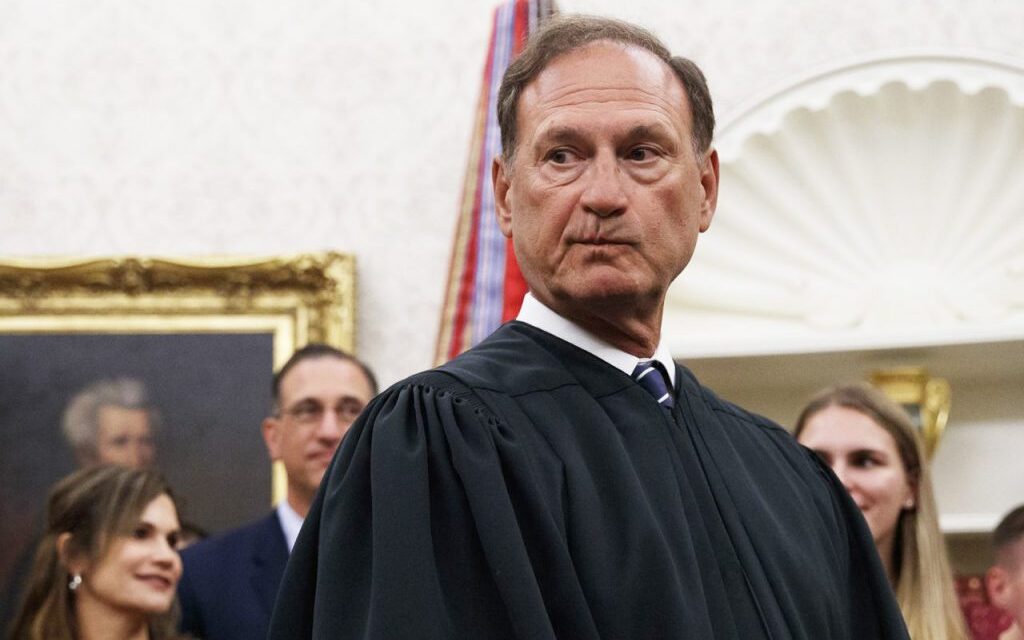By Kyle Whitmire, state political columnist for the Alabama Media Group, 2020 winner of the Walker Stone Award, winner of the 2021 SPJ award for opinion writing, and 2021 winner of the Molly Ivins prize for political commentary.
This is an opinion column.
As long as I can remember, there was a net under Alabama. The net had been there long before I was born.
It won’t be there much longer, it seems. Monday night, news broke that the United States Supreme Court had taken out its scissors, and I dread what that means for the future of my state.
But I have a pretty good idea of what’s coming next.
I’m not sure who wove the first threads together, but Frank Johnson, the federal judge and law school classmate of George Wallace, tied many of its most important knots.
Whenever “Little George,” as their law school cohort called him at Alabama, passed a racist law, or deprived voters of their constitutional rights, or cheated the mentally ill out of care, or made Alabama prisons into torture chambers — Johnson stopped him with the power of the federal judiciary.
This happened so often that people began calling Johnson the “real governor of Alabama,” something Little George despised. Little George went around telling people Johnson needed a “barbed-wire enema,” and not much later, the Klan firebombed Johnson’s mother’s house thinking it was his.
Johnson was undeterred and kept threading that net, and Johnson was still working on it long after Little George’s influence had begun to fade.
Late in life, when Little George’s conscience began to get the best of him, he reached out to Johnson to apologize.
“I sent him a message that, if he wanted to get forgiveness, he’d have to get it from the Lord,” Johnson said later.
The net under Alabama is the federal judiciary, and the net prevents Alabama from pushing its weakest and most vulnerable into an abyss of meanness and hate.
Unfortunately, the net has saved Alabama from itself so many times that lawmakers and governors learned to rely on it when passing legislation.
With a pass-it-and-see-what-sticks recklessness, they could reap the political benefits of awful bills and, like Little George, blame the judiciary when it ruled their nasty little laws unconstitutional. It’s not uncommon, even today, to hear lawmakers say, “Pass it and let the courts decide.”
Alabama politicians loved the net, even as they cussed it.
For a time, at least, the net held — mended and reinforced by other federal judges and higher courts — not the least of which being the United States Supreme Court.
But almost a decade ago, when the United States Supreme Court ruled in Shelby vs. Holder that protections against voter suppression were unconstitutional, a vital thread snapped.
Almost immediately, Southern states including Alabama began passing new voting restrictions and closing voting precincts. Alabama even tried to pass voter ID at the same time it closed driver’s license offices in the Black Belt.
Other threads have broken since and Monday night the whole net tore.
Politico reported the United States Supreme Court had voted earlier this year to overturn Roe v. Wade and Planned Parenthood v. Casey, two landmark decisions protecting reproductive rights.
It’s a draft version, an early look. But the debate appears settled. It’s all over but the editing.
Now let me tell you what this means for Alabama.
In 2019, Alabama Republicans passed “toughest in the nation” restrictions on abortion in the state. Those restrictions are so severe that they do not allow exemptions for victims of rape or incest.
If a 12-year-old girl gets pregnant after being molested by her uncle, Alabama Republican lawmakers would have that child carry that pregnancy to term. If a doctor helped such a girl end such a pregnancy, that doctor would be guilty of a felony carrying a sentence of up to life in prison.
When Alabama House Democrats attempted to amend the bill to include those exceptions, lawmakers shot the changes down in a 72-to-26 vote.
They voted, to require rape victims to have rapists’ babies, even after Democrats pointed out the bill did not strip rapists of parental rights.
Quietly and on background, some Republicans shared their reservations with me. The lack of rape and incest exemptions troubled them, they said, but not so much that they would express those concerns openly and also not enough to change their votes.
Because of the net.
Those lawmakers understood — or so they thought — that it didn’t really matter since Roe was there to stop them. If they went too far, the courts would always stop them, they assumed.
And perhaps that was the flaw of the net. It protected lawmakers as well as the people they would hurt through their politics of meanness.
It’s a protection other Little George-like politicians in other states have noticed and begun to exploit, too.
But now the net is gone, cut by a new Supreme Court majority. There is no guarantee anymore that the federal judiciary will protect Alabama from itself anymore. Alabamians will have to live with the consequences.
And if established law, such as Roe, is fair game for repeal, other decisions are at risk, too.
Workplace protections.
Marriage equality.
Voting rights.
Civil rights.
Already, there is an Alabama case before the court, scheduled to be heard later this year, that the court could easily use to gut the rest of the Voting Rights Act.
Alabama is responsible for its own actions now.
And we’re going to need a lot more forgiveness from the Lord.












